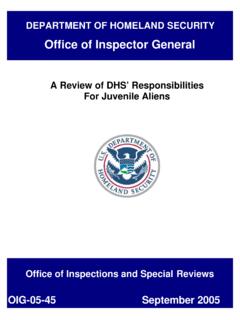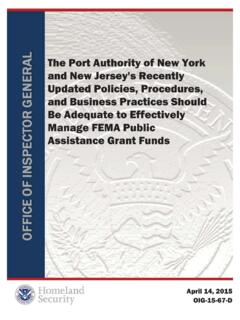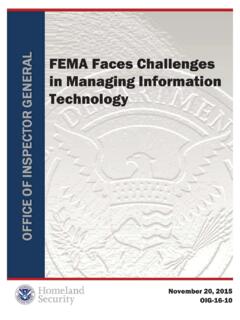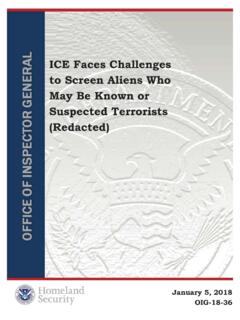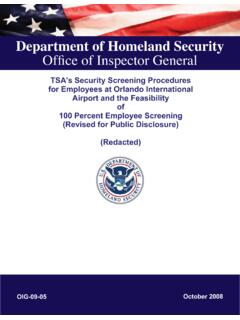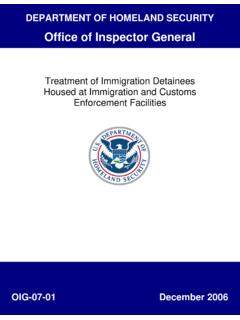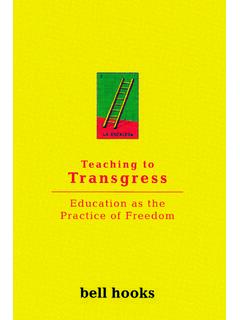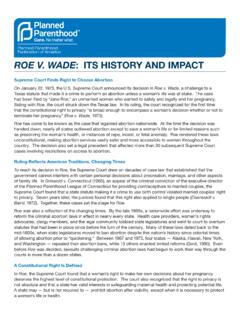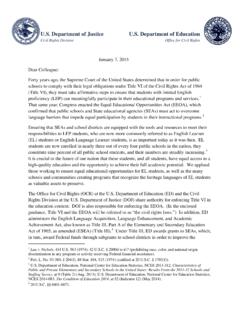Transcription of OIG-18-84 - Special Review - Initial Observations ...
1 Special Review - Initial Observations Regarding Family Separation Issues Under the Zero Tolerance Policy September 27, 2018. OIG-18-84 . DHS OIG HIGHLIGHTS. Initial Observations Regarding Family Separation Issues Under the Zero Tolerance Policy .. September 27, 2018 What We Observed DHS was not fully prepared to implement Why We Did This the Administration's Zero Tolerance Policy or to deal with some of its after-effects. Special Review Faced with resource limitations and other challenges, DHS regulated the number of In light of the heightened public asylum-seekers entering the country and congressional interest in through ports of entry at the same time that the Department of Homeland it encouraged asylum-seekers to come to Security's separation of families the ports. During Zero Tolerance, CBP also at the southern border held alien children separated from their pursuant to the Government's parents for extended periods in facilities Zero Tolerance Policy, the DHS intended solely for short-term detention.
2 Office of Inspector General DHS also struggled to identify, track, and (OIG) conducted unannounced reunify families separated under Zero site visits to Customs and Tolerance due to limitations with its Border Protection and information technology systems, including Immigration and Customs a lack of integration between systems. Enforcement facilities in and around El Paso and McAllen, Finally, DHS provided inconsistent Texas on June 26 28, 2018. information to aliens who arrived with The following report describes children during Zero Tolerance, which OIG's Observations in the field resulted in some parents not and its analysis of family understanding that they would be separation data provided by the separated from their children, and being Department. unable to communicate with their children after separation. What We Recommend DHS' Response This report is observational and Appendix B provides DHS' management contains no recommendations.
3 Response in its entirety. For Further Information: Contact our Office of Public Affairs at (202) 981-6000, or email us at OIG-18-84 .. OFFICE OF INSPECTOR GENERAL. Department of Homeland Security . Washington, DC 20528 / . September 27, 2018. MEMORANDUM FOR: The Honorable Kevin K. McAleenan Commissioner Customs and Border Protection Ronald D. Vitiello Senior Official Performing the Duties of the Director Immigration and Customs Enforcement FROM: John V. Kelly Senior Official Performing the Duties of the Inspector General SUBJECT: Special Report Initial Observations Regarding Family Separation Issues Under the Zero Tolerance Policy For your action is the final Special report Initial Observations Regarding Family Separation Issues Under the Zero Tolerance Policy. This Special report reflects work undertaken pursuant to our authorities and obligations under Section 2.
4 Of the Inspector General Act of 1978, as amended. Specifically, the Department of Homeland Security (DHS) Office of Inspector General performed this work for the purpose of promoting economy, efficiency, and effectiveness in the administration of, and preventing fraud, waste, and abuse in, DHS' programs and operations. This final Special report addresses the technical comments and incorporates the management response provided by your offices. This report is observational and contains no recommendations. Consistent with our responsibility under the Inspector General Act of 1978, as amended, we will provide copies of our report to Congress and will post it on our website for public dissemination. Please call me with any questions, or your staff may contact Jennifer Costello, Chief Operating Officer, at (202) 981-6000. Attachment . OFFICE OF INSPECTOR GENERAL. Department of Homeland Security.
5 Background On April 6, 2018, President Trump directed several Federal agencies, including the Department of Homeland Security (DHS), to report on their efforts to end a practice developed under prior administrations of releasing certain individuals suspected of violating immigration law into the United States pending resolution of their administrative or criminal cases a practice sometimes referred to as catch and release. 1 The same day, Attorney General Jeff Sessions directed all Federal prosecutors along the Southwest Border to work with DHS to adopt immediately a zero-tolerance policy requiring that all improper entry offenses be referred for criminal prosecution to the extent practicable (referred to throughout this report as the Zero Tolerance Policy).2. Within DHS, Customs and Border Protection (CBP) and Immigration and Customs Enforcement (ICE) played critical roles in implementing the Administration's Zero Tolerance Policy.
6 CBP's Office of Field Operations (OFO). inspects all foreign visitors and goods entering at established ports of entry, while Border Patrol is responsible for apprehending individuals who enter the United States illegally between ports of entry. CBP transfers aliens in its custody to ICE, which is responsible for, among other duties, detaining certain aliens with pending immigration proceedings and deporting all aliens who receive final removal orders. Before implementation of the Zero Tolerance Policy, when CBP apprehended an alien family unit attempting to enter the United States illegally, it usually placed the adult in civil immigration proceedings without referring him or her for criminal prosecution. CBP only separated apprehended parents from children in limited circumstances , if the adult had a criminal history or outstanding warrant, or if CBP could not determine whether the adult was the child's parent or legal guardian.
7 Accordingly, in most instances, family units either remained together in family detention centers operated by ICE while their civil immigration cases were pending,3 or they were released into the United States with an order to appear in immigration court at a later date.. 1 Presidential Memorandum for the Secretary of State, the Secretary of Defense, the Attorney General, the Secretary of Health and Human Services, and the Secretary of Homeland Security, April 6, 2018. 2 Dept. of Justice, Memorandum for Federal Prosecutors Along the Southwest Border, April 6, 2018. Entering the United States without inspection and approval is a civil offense and may also result in criminal charges. See 8 United States Code ( ) 1227 (civil grounds for removal), 1325 (crime of improper entry), 1326 (crime of reentry). The Department of Justice has the authority to decide whether and to what extent to prosecute Federal crimes.
8 3 A Federal court has interpreted the Flores Agreement a 1997 settlement that establishes minimum conditions for the detention, release, and treatment of children to generally limit 2 OIG-18-84 . OFFICE OF INSPECTOR GENERAL. Department of Homeland Security .. The Zero Tolerance Policy, however, fundamentally changed DHS' approach to immigration enforcement. In early May 2018, DHS determined that the policy would cover alien adults arriving illegally in the United States with minor children. Because minor children cannot be held in criminal custody with an adult, alien adults who entered the United States illegally would have to be separated from any accompanying minor children when the adults were referred for criminal prosecution. The children, who DHS then deemed to be unaccompanied alien children,4 were held in DHS custody until they could be transferred to the Department of Health and Human Services (HHS) Office of Refugee Resettlement, which is responsible for the long-term custodial care and placement of unaccompanied alien The Administration's Zero Tolerance Policy and the resulting family separations sparked intense public debate.
9 On June 20, 2018, President Trump issued Executive Order 13,841, halting the practice of family separation. On June 26, 2018, a Federal court ordered the Government to reunify separated children and parents within 30 On September 20, 2018, the Government reported to the court that it had reunified or otherwise released 2,167 of the 2,551 children over 5 years of age who were separated from a parent and deemed eligible for reunification by the The Government also . the time children can stay at such family centers to 20 days. Flores v. Lynch, 212 F. Supp. 3d 907, 914 ( Cal. 2015). In July 2018, that Federal court denied the Government's request to modify the Flores Agreement to allow it to detain families for longer. Flores v. Sessions, 85-cv- 4544 ( Cal. July 9, 2018). However, in August 2018, another Federal court permitted families to remain in Government facilities together longer than 20 days if the adult waives the child's rights under the Flores Agreement.
10 Ms. L. v. ICE, 18-cv-428 ( Cal. Aug. 16, 2018). DHS and HHS recently proposed regulations that, if implemented, would terminate the Flores Agreement. 83 Fed. Reg. 45,486 (Sept. 7, 2018). 4 An unaccompanied alien child is a child under 18 years of age with no lawful immigration status in the United States who has neither a parent nor legal guardian in the United States nor a parent nor legal guardian in the United States available to provide care and physical custody for him or her. 6 279(g)(2). As such, children traveling with a related adult other than a parent or legal guardian such as a grandparent or sibling are still deemed unaccompanied alien children. 5 DHS must transfer unaccompanied alien children to HHS within 72 hours unless there are exceptional circumstances. 8 1232(b)(3). There are Special requirements for unaccompanied alien children from Mexico and Canada that may permit a different process, 8.
